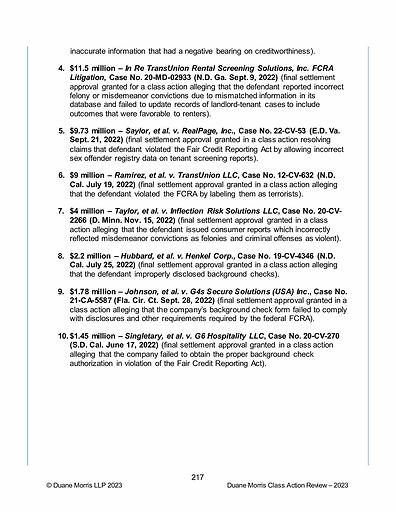Duane Morris Class Action Review - 2023 - Report - Page 216

The court of appeals affirmed the trial court’s dismissal of his FCRA claim because the
alleged “confusion suffered by [the plaintiff] is, by itself, insufficient to constitute injury…”
Id. at 596. Indeed, the plaintiff had not alleged that the consumer report obtained by
Circle K contained “any defamatory content or other per se injurious content,” or “false
or inaccurate information.” Id. Moreover, he did not allege that Circle K had taken any
adverse actions against him, due to the alleged “stand alone” document violations. Id.
Therefore, the court of appeal held that the trail court was correct to dismiss his FCRA
claims for lack of standing.
In Schumacher, et al. v. SC Data Center, Inc., 33 F.4th 504, 511 (8th Cir. 2022), the
Eighth Circuit took up the issue of standing in relation to the FCRA requirement that
employers provide an “adverse action” notice to the applicants before denying
employment on the basis of a consumer report. Unlike the plaintiff in Limon, the
plaintiff’s job offer in Schumacher was rescinded due to a negative consumer report,
without the employer providing the “adverse action notice” required by the FCRA. Id.
However, the plaintiff did not challenge the accuracy of her consumer report. Id. at 512.
She instead argued that the employer’s failure to provide the adverse action notice
deprived her of the opportunity to “explain” to her prospective employer the “negative
but accurate information” contained in her consumer report. Id. The Eighth Circuit
rejected this argument on the basis that “[n]either the text of the FCRA nor the
legislative history provide support for [the plaintiff’s] claim that she has a right under
the FCRA to not only receive a copy of her consumer report, but also discuss directly
with the employer accurate but negative information within the report prior to the
employer taking adverse action. Id. at 511-12. Therefore, plaintiff could not show that
she had suffered any injury-in-fact that could be redressed by the courts. Id. at 512.
It is important to note, however, that the Schumacher decision also reveals a federal
circuit split on this issue. As the Schumacher points out, the Third and Seventh Circuits
have taken an opposite view regarding whether failure to provide an adverse action
notice, alone, is sufficient to show injury-in-fact. Id. at 510. The Third Circuit has held
that “taking an adverse employment action without providing the required consumer
report is ‘the very harm that Congress sought to prevent, arising from prototypical
conduct proscribed’ by the FCRA.” Long, et al. v. Southeastern Pennsylvania
Transportation Authority, 903 F.3d 312, 324 (3d Cir. 2018) (quoting Susinno, et al. v.
Work Out World Inc., 862 F.3d 346, 348 (3d Cir. 2017)). Similarly, the Seventh Circuit
has held that applicants who do not receive adverse action notices can show injury-infact, because [p]roviding context may be more valuable than contesting accuracy” since
“information that seems damning at first glance might not be so bad in context.”
Robertson, et al. v. Allied Solutions, LLC, 902 F.3d 690, 697 (7th Cir. 2018). Moreover,
although the FCRA may not require employers to allow applicants to “explain to a
prospective employer negative but accurate information in a consumer report prior to
the employer taking an adverse employment action,” Schumacher, 33 F.4th 504 at 512,
many states and localities provide applicants and employees with this right. For
example, the Illinois Employee Background Fairness Act requires employers who are
considering taking an adverse action on the basis of an applicant or employee’s
conviction history, to give that applicant or employee five business days to provide any
explanation, including “submission of evidence challenging the accuracy of the
215
© Duane Morris LLP 2023
Duane Morris Class Action Review – 2023













